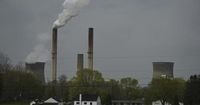On September 18, 2025, a pivotal moment unfolded in the ongoing battle over U.S. climate policy. As the Trump administration pressed forward with a controversial proposal to eliminate federal regulation of greenhouse gas emissions, a broad coalition of scientists, lawmakers, and public health advocates mounted a vigorous defense of the science underpinning America’s climate protections. The clash, which centers on the Environmental Protection Agency’s (EPA) foundational 2009 “endangerment finding,” has drawn sharp lines between scientific consensus and political maneuvering, with consequences that stretch from the halls of Congress to the storm-battered neighborhoods of Texas.
At the heart of the controversy is EPA Administrator Lee Zeldin’s recent proposal to revoke the federal government’s ability to regulate greenhouse gas emissions—protections that have served as the backbone of U.S. climate regulations for over a decade. According to the National Academies of Sciences, Engineering and Medicine, the 2009 endangerment finding, based on decades of research, determined that six greenhouse gases—including carbon dioxide—pose significant risks to public health and welfare. This finding has not only justified a suite of environmental regulations but has also been repeatedly affirmed by the scientific community as accurate and, if anything, strengthened by new evidence over the past 16 years.
“The climate crisis is not a far-off event or a theory—it is already here and endangering our constituents,” wrote U.S. Representative Lloyd Doggett (D-Austin) and most Texas Democratic Congressmembers in a letter opposing the EPA’s proposed rollback. Citing recent disasters, Doggett’s letter highlighted that Central Texas floods in July 2025, exacerbated by climate change, claimed at least 137 lives. The lawmakers further noted that half of the residential flooding during Hurricane Harvey was attributed to climate change, and that heat-related deaths in Texas have broken state records for four consecutive years. As Doggett’s coalition argued, “Regulating greenhouse gas emissions is necessary to protect human health and the environment.”
The scientific community has echoed and amplified these concerns. On the same day as the lawmakers’ letter, the National Academies released a comprehensive report reaffirming that human use of fossil fuels is warming the planet and threatening public health and welfare. The 16-member panel, which included climate scientists, engineers, public health experts, and even former Trump administration officials and fossil fuel industry consultants, concluded that the 2009 endangerment finding “was accurate at the time in 2009, it has stood the test of time exceedingly well, and is now even stronger, because it is being reinforced by new evidence,” according to review committee chair Shirley Tilghman, a molecular biologist and former Princeton University president.
Transparency and diversity were hallmarks of the National Academies report. The committee solicited public input from over 200 individuals and organizations, and required all contributors to disclose any conflicts of interest, including investments in fossil fuel companies. As Carlos Martinez of the Union of Concerned Scientists explained, “It’s a part of the robust nature of peer review, of scientific consensus and judgment, when it comes to collecting information, developing and vetting authors.” The process stood in stark contrast to the Department of Energy’s (DOE) competing climate report, which was drafted by just five known climate contrarians without public comment or transparent review. That DOE document has been widely criticized for errors and misleading claims, and a federal judge recently rebuked the agency for crafting the report in secret, ruling that it should not be considered in the EPA’s effort to overturn the endangerment finding.
The stakes of this debate are anything but abstract. As the National Academy of Sciences (NAS) emphasized in its own statement, “Evidence that climate change harms public health is beyond scientific dispute.” The NAS, a non-governmental nonprofit established in 1863 to advise the government on science, underscored that human activity is releasing greenhouse gases that are warming the planet, increasing extreme temperatures, and changing oceans—all dangerous developments for the health and welfare of the American public. The group noted that evidence supporting these risks has only grown stronger since 2009, and that “responding to the potential harm to human health and welfare from changes in the climate is actionable now.”
The Trump administration, however, has maintained a markedly different stance. The Department of Energy has suggested that climate models overstate future warming, that long-term trends for disasters like wildfires don’t show much change, and that increased carbon levels could even have benefits, such as spurring plant growth. These assertions have been roundly challenged by the NAS and other mainstream scientific organizations. For instance, the NAS provided evidence that climate change has worsened U.S. wildfires by lengthening fire seasons and increasing drought, and presented comprehensive data showing that sea level rise is accelerating—contradicting DOE claims that relied on a limited set of tidal stations.
Critics of the Trump administration’s approach are not limited to scientists. Environmental and public health advocates warn that rolling back the endangerment finding would pave the way for gutting regulations on pollution from cars, power plants, and other major sources, with far-reaching health and economic consequences. According to the Texas lawmakers’ letter, eliminating these protections would “force American families to pay more for health care because such pollutants can lead to heart disease, respiratory illnesses like asthma, cancer, and more.”
Meanwhile, the political and institutional fallout is already being felt. The National Academies has warned that it may have to lay off about 250 of its 1,100 employees by the end of 2025 due to federal research cuts and the elimination of contracts under the Trump administration. Thousands of federal scientists have already left government service, either through layoffs or early retirements, as the administration seeks to cut billions of dollars from climate research and scientific equipment budgets—including those supporting vital orbiting satellites.
The legal battle over climate science is also intensifying. Environmental groups have challenged the DOE’s documents in court, arguing that the administration’s work is filled with “errors, bias and distortion.” In a recent ruling, Judge William Young wrote that the DOE report was “no mere ‘review’ of the literature” and that “to suggest otherwise borders on sophistry.” While the court declined to block the report’s consideration outright, it sided with critics regarding the flawed process behind its creation.
Despite these headwinds, the scientific consensus remains firm. As the NAS’s report concluded, “The United States faces a future in which climate-induced harm continues to worsen and today's extremes become tomorrow's norms.” For Texans, already grappling with record heat, deadly floods, and the spread of tropical diseases, the stakes could hardly be higher. As the deadline approaches for public comment on the EPA’s proposal—set for September 22, 2025—advocates urge citizens to make their voices heard on an issue that will shape the nation’s health, economy, and environment for generations to come.



